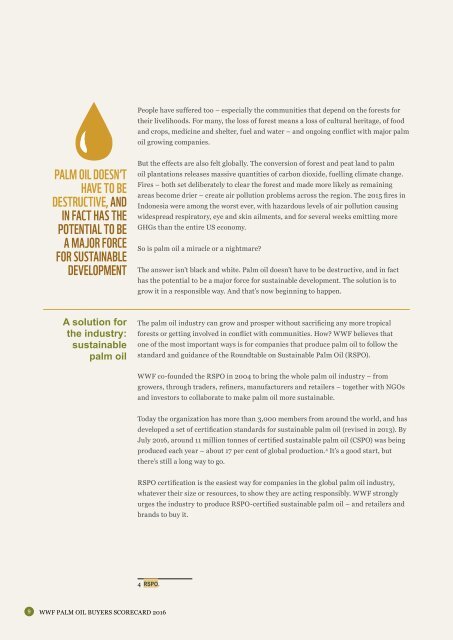Palm Oil Buyers Scorecard
WWF_Palm_Oil_Scorecard_2016
WWF_Palm_Oil_Scorecard_2016
You also want an ePaper? Increase the reach of your titles
YUMPU automatically turns print PDFs into web optimized ePapers that Google loves.
People have suffered too – especially the communities that depend on the forests for<br />
their livelihoods. For many, the loss of forest means a loss of cultural heritage, of food<br />
and crops, medicine and shelter, fuel and water – and ongoing conflict with major palm<br />
oil growing companies.<br />
PALM OIL DOESN’T<br />
HAVE TO BE<br />
DESTRUCTIVE, AND<br />
IN FACT HAS THE<br />
POTENTIAL TO BE<br />
A MAJOR FORCE<br />
FOR SUSTAINABLE<br />
DEVELOPMENT<br />
But the effects are also felt globally. The conversion of forest and peat land to palm<br />
oil plantations releases massive quantities of carbon dioxide, fuelling climate change.<br />
Fires – both set deliberately to clear the forest and made more likely as remaining<br />
areas become drier – create air pollution problems across the region. The 2015 fires in<br />
Indonesia were among the worst ever, with hazardous levels of air pollution causing<br />
widespread respiratory, eye and skin ailments, and for several weeks emitting more<br />
GHGs than the entire US economy.<br />
So is palm oil a miracle or a nightmare?<br />
The answer isn’t black and white. <strong>Palm</strong> oil doesn’t have to be destructive, and in fact<br />
has the potential to be a major force for sustainable development. The solution is to<br />
grow it in a responsible way. And that’s now beginning to happen.<br />
A solution for<br />
the industry:<br />
sustainable<br />
palm oil<br />
The palm oil industry can grow and prosper without sacrificing any more tropical<br />
forests or getting involved in conflict with communities. How? WWF believes that<br />
one of the most important ways is for companies that produce palm oil to follow the<br />
standard and guidance of the Roundtable on Sustainable <strong>Palm</strong> <strong>Oil</strong> (RSPO).<br />
WWF co-founded the RSPO in 2004 to bring the whole palm oil industry – from<br />
growers, through traders, refiners, manufacturers and retailers – together with NGOs<br />
and investors to collaborate to make palm oil more sustainable.<br />
Today the organization has more than 3,000 members from around the world, and has<br />
developed a set of certification standards for sustainable palm oil (revised in 2013). By<br />
July 2016, around 11 million tonnes of certified sustainable palm oil (CSPO) was being<br />
produced each year – about 17 per cent of global production. 4 It’s a good start, but<br />
there’s still a long way to go.<br />
RSPO certification is the easiest way for companies in the global palm oil industry,<br />
whatever their size or resources, to show they are acting responsibly. WWF strongly<br />
urges the industry to produce RSPO-certified sustainable palm oil – and retailers and<br />
brands to buy it.<br />
4 RSPO.<br />
9 WWF PALM OIL BUYERS SCORECARD 2016




